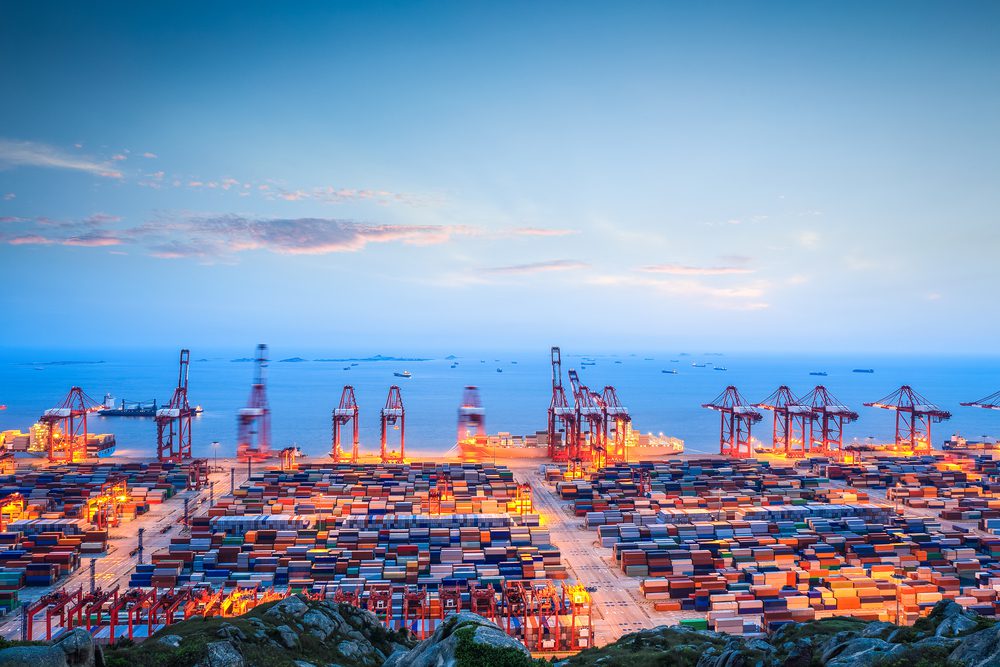By Bloomberg News
(Bloomberg) — Five years after it passed Singapore to become the world’s largest container port by throughput, Shanghai is finding it a struggle to become a leader in shipping services too.
China’s financial capital still lags behind Singapore, London, Hong Kong, Rotterdam and Hamburg for overall port conditions and maritime services, according to an annual ranking conducted by China’s Xinhua News Agency and the Baltic Exchange, a provider of information on shipping markets.
Zhen Hong, secretary general of the Shanghai International Shipping Institute, said the goal is for Shanghai to become a global shipping leader within the next five years. Declining trade — Chinese exports have fallen for four straight months, while imports are in a year-long slump — will slow the port’s growth but won’t stop it, he said.
“We may not reach the target with flying colors,” Zhen said in a Nov. 9 interview, “but we’ll be able to basically achieve it.”
Largest Port
In 2009, China announced a plan to establish an international shipping center by 2020 with “capabilities to allocate global shipping resources.” Shanghai received a boost when the central government made it the site of the first national-level free-trade zone, a place to test policies such as greater capital-account convertibility and cross-border yuan settlement and financing.
The rapid growth of the Chinese economy helped drive up Shanghai’s throughput numbers. But size isn’t everything when it comes to shipping services.
“Just by handling the largest volume in the world doesn’t necessarily make it the best place from the shipping companies’ perspective,” Parash Jain, a Hong Kong-based shipping analyst at HSBC Securities Asia Ltd., said in a phone interview. “On maritime services, Shanghai has miles to cover in terms of ship registration, shipping brokerage, ship management, financing and bunkering.”
Key to this would be developing shipping services such as insurance, maritime arbitrage and ship financing, Zhen and Jain both said.
High financing costs in China are hampering the development of industries such as ship financing and insurance, Jain said.
London Calling
London, which served as the center of Britain’s maritime empire, remains the global leader in shipping services. It currently controls a third of the world’s shipping insurance market and handles the lion’s share of maritime dispute arbitration, according to Maritime London, a non-profit industry group. The London Maritime Arbitrators Association received almost 3,000 cases in 2013, while Shanghai handles a few hundred a year, Zhen said.
“We can’t catch up” with London in five years, Zhen said. “Our aim is to have a notable increase in high-end shipping services.”
Zhen is confident Shanghai can maintain its lead in container volume over Singapore. Last year Shanghai had 35.2 million twenty-foot equivalent units, or TEUs, of container traffic, compared with 33.9 million for Singapore. Rounding out the top five global ports were Shenzhen, Hong Kong and Ningbo, all part of China.
Zhen said Singapore should handle about 40 million TEUs of cargo five years from now. He declined to give a forecast for Shanghai’s throughput in 2020, but said the institute has set a target of 50 million TEUs for 2030.
Free-Trade Boost
Singapore is taking steps to boost its profile, including relocating port operations to a site with 65 million TEUs of capacity, a move that should be complete by 2023. Shanghai is expanding its main deepwater port of Yangshan, but won’t immediately be able to match Singapore’s augmented capacity, Jain said.
One advantage could be Shanghai’s free-trade zone, which opened in 2013. The government has relaxed cabotage rights there and implemented new investment rules, some of which have also been extended to free-trade zones in Tianjin, Fujian and Guangdong that opened this year. The Shanghai zone also pioneered a series of streamlined customs and bonding procedures.
Most popular among the policies is one that lets foreign shipping companies operate wholly owned ship-management companies, Zhen said. So far about 10 companies have set up management companies in the Shanghai zone, he said. The Shanghai zone also is testing a policy that allows foreigners full ownership of shipping companies, according to Zhang Jieshu, the shipping institute’s deputy party secretary.
“Ship owners might have more confidence in foreign management companies as they are better organized and have experience,” Zhen said. “This represents a market opportunity for foreign companies and doesn’t require a lot of capital.”
©2015 Bloomberg News

 Join The Club
Join The Club











